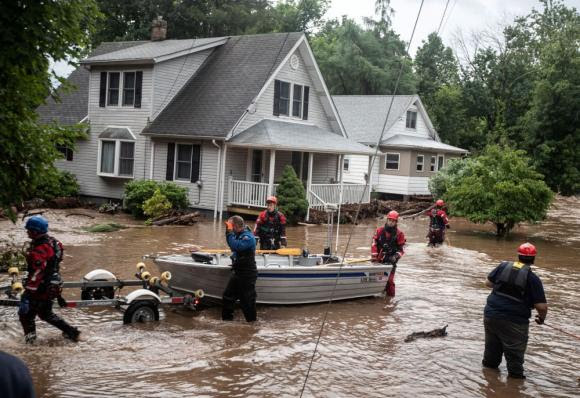Floods, droughts, heatwaves — Will things ever be 'normal' again?Your weekly newsletter about faith and climate change July 14, 2023  Emergency personnel maneuver a boat used to rescue residents of flooded homes in Stony Point, N.Y., July 9, 2023. (OSV News/Reuters/USA Today Network/Seth Harrison) Many writers hope their work will resonate with readers for a very long time. A notable exception to that standard might be those of us who write about climate change. This week, I found myself thinking about an essay I published in Millennial Journal back in 2017. Written shortly after Hurricane Harvey hit the southern coast of the United States, in it I talk about the model of Noah as an environmentalist and what the biblical story of The Great Flood can teach us about humanity's role amid ecological disasters. I wish it wasn't still relevant today. But from floods in Vermont, to droughts in California, to wildfires in Canada and hazardous air quality in New York, extreme weather events continue. And those I've just cited are all contained to what's being experienced in North America. Across other regions of the planet, the situation is regularly much worse, plaguing often already vulnerable communities with preventable suffering that leads to death for plants, creatures, ecosystems and human communities. It does not have to be this way. In fact, in its report last year, the United Nations Intergovernmental Panel on Climate Change, regarded as the leading scientific bodies on the topic, said the solutions we need to mitigate and adapt to climate change already exist and we know what they are and how well they work. What's lacking is the political and financial willpower to develop effective solutions to scale, implement them accordingly and do it quickly. While pursuing that political and financial support isn't going to be easy, it means predictions of a perilous future do not have to become reality. Correcting the course of climate change is possible. We see glimmers of what that could look like in how some communities of faith are responding to current climate catastrophes. In response to intense flooding across much of Vermont this week, a Catholic parish opened its doors to provide refuge for those who couldn't safely stay home. A community member among them prepared a meal for those staying the night at the church. Read more: Biden declares state of emergency in Vermont due to flooding On the other side of the country, experiencing the opposite precipitation problem, an Episcopal church in California has converted their lawn and gardens with water conservation front of mind in response to ongoing drought. Read more: In California, drought-resistant church gardens conserve water, connect community While we need systems-level solutions to create the necessary thrust toward a livable future, it's heartening to be able to share examples with you of faith communities addressing the current needs of those displaced by climate impacts and making choices to prevent further environmental degradation. I look forward to the day when reading about the biblical "Great Flood" doesn't feel so relevant, and our role as protectors of creation isn't something about which people need to be constantly reminded. Because if you know the story well (at least the children's version), you know it ends with a rainbow.  St. Mary's Episcopal Church is four blocks from the Pacific Ocean in downtown Laguna Beach, California. In 2022, the gardens transitioned to all native California plants. (Martha Simkins Davis) What else is new on EarthBeat:Revise a self-centered spirituality with this daily ecological examen Gardening helps priest from India connect with Catholics in Vermont 'Right to life' at stake: Catholics react to high court's ruling on Navajo water rights What's happening in other climate news:How climate change drives hotter, more frequent heat waves —Joseph Winters for Grist 'They're in the air, drinking water, dust, food …' How to reduce your exposure to microplastics —Amy Fleming for The Guardian Climate talks chief, who also heads oil company, says world must 'attack all emissions, everywhere' —Frank Jordans for The Associated Press How northern Mexico became a climate migration destination —Caroline Tracey for High Country News Final Beat:On July 14, Catholics celebrate the feast day of St. Kateri Tekakwitha, the first Indigenous saint from North America, popularly considered a patron saint of ecology.
Featured AdvertisersAdvertisement |
In this blog, we'll look at how men and women at serving Jesus Christ both at home and abroad. We'll focus on how God is using their work to transform the lives of people all over the world.
Friday, July 14, 2023
EarthBeat Weekly: Floods, droughts, heatwaves — Will things ever be 'normal' again?
Subscribe to:
Post Comments (Atom)
WCC News: WCC condemns violence against communities in Myanmar
The World Council of Churches (WCC) condemns military strikes against civilians and civilian areas in Myanmar. Photo: Albin Hillert/WCC 17 ...

-
Genocide, Worker Rights, and White Christian Nationalism NCC Newsletter July 2, 2021 Click here to donate Recent Interview with Jim Winkl...
-
As we enter this sacred season — a time when many traditions gather to celebrate light in the darkness, rest after a long year, and the endu...
-
View this email in your browser Welcome to the Truth and Action Roundup, a reliable weekly source of information, inspiration, and action f...

 Stephanie Clary
Stephanie Clary

No comments:
Post a Comment